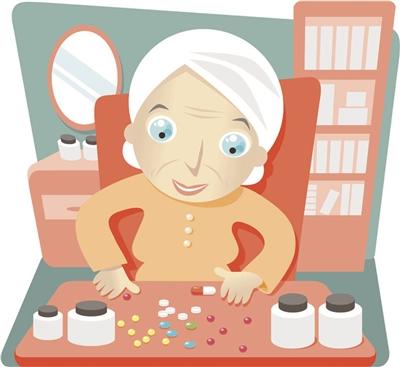Tell our parents to follow the six principles of medication
Due to the special physiological conditions of the elderly, they are more prone to adverse drug reactions than the young. Therefore, the elderly should be more cautious in choosing drugs. However, due to the decline in awareness of the elderly, it is not easy to grasp the principles of drug selection, so children are required to check them. The elderly should master the following principles when choosing drugs:
1. The principle of simple medication and individualization
The medication for the elderly should be as simple as possible, the variety should not be too many, and the dosage should not be too large. The medication should be taken in strict accordance with the doctor's advice or under the guidance of the pharmacist, and the medication plan should be adjusted in time according to the doctor's advice. For the elderly with low awareness, it is best to take the medicine with the help of family members, and pay attention to the effects and side effects at any time. In addition, drug treatment varies from person to person, and a safe, reasonable, effective, and economical drug treatment plan is formulated on the basis of full consideration of the physiological and pathological characteristics of the elderly individuals and other drugs being taken.
2. The principle of clear indication for medication
For a disease that has been diagnosed, you should take symptomatic medication under the guidance of a doctor, and you must never make your own claim. Don't believe in advertisements, and don't believe in the secret recipes of Jianghu doctors and use drugs blindly.
3. The principle of using no more than five drugs
This principle is based on the relationship between the number of drugs used and the incidence of adverse drug reactions. According to statistics, the adverse reaction rate of drugs with less than five drugs is 4%, six to ten are 10%, eleven to fifteen are 25%, and sixteen to twenty are 54%. Due to the coexistence of many diseases, the elderly often use multiple medications, which not only easily reduces compliance, but also easily leads to adverse drug reactions. When more than five drugs are used, it is necessary to consider whether they are all necessary drugs, as well as issues such as compliance and adverse drug reactions.
4. The principle of economical medication
Some elderly people think that the high price is the good effect. It is often easy to follow the recommendations of others or pharmacy salespersons and choose high-priced drugs. In fact, the price and efficacy are not necessarily the same. For example, when purchasing drugs on their own, if you compare the composition, mechanism of action, and indications of similar drugs for the same disease, it is not difficult to find that some drugs have basically the same composition and effect, but due to different packaging and brands, Prices also vary greatly. Therefore, especially in the self-medication of "minor illness going to the pharmacy", you can choose to use good and economical medicines.
5. The principle of medication not blindly
Nowadays, self-purchasing drugs is becoming more and more common. But medicines are not ordinary commodities after all, and consumers are generally not familiar with the properties of medicines. Therefore, it is best for consumers to purchase medicines by themselves at a regular pharmacy and consult a licensed pharmacist about safe medication.
6. Principles of monitoring medication
The elderly generally suffer from a variety of chronic diseases and the course of the disease is generally longer. As a result, some elderly people who "have become medically ill for a long time" may reduce their medical treatment and ask their family members to go to the hospital to prescribe medicines on their behalf, or choose their own medicines in pharmacies. In fact, medication is not static. Some elderly people will not achieve the desired effect by relying on the original medication as they age or change due to climate factors. If the climate turns cold, blood pressure generally rises, and some may cause blood pressure to rise sharply when the weather suddenly turns cold. At this time, you should increase the drug dosage or increase the combination of drugs under the guidance of a doctor. Therefore, in the process of medication for the elderly, it is best to record the medication in detail, including the name of the medication, dosage, time of medication, subjective feelings after medication, and basic physical signs changes, so as to monitor medication safety and adverse reactions at any time. These contents can provide physicians with detailed and important information during follow-up visits and special circumstances, so that the best treatment plan can be selected according to the medication situation.
Text/Wu Shimin

